HCS Highlights
SUMMER 2024


Reflection Washington



Reflection Washington

Cathy Kinnaman Director
As part of our ongoing efforts to improve services and meet the growing needs of our clients and community partners, I am excited to share some significant changes within HCS. These changes are aimed at better serving our community and supporting our staff, strengthening our divisional capacity and efficiency. We also listened to the concerns you raised in the employee survey related to change and the desire to have more information about upcoming changes earlier and to have a voice in changes that may impact you and the work you do.
In the spring of 2024, HCS added three new financial Deputy Regional Administrators to the field. During the summer and fall of 2024, a new Human-Centered Design, Innovation, and Projects (HIP) team will be established as an office reporting directly to me; a third Deputy Director position will be added at headquarters; and an Office Chief of Medical Services will be recruited to add clinical/physician expertise to the organization.
HCS is experiencing substantial growth in caseloads and complexity, coupled with new legislative mandates to serve additional populations and multiple new federal requirements that will impact the work we do in the near future. These factors, as well as increased pressure from community partners to streamline service delivery, necessitate immediate action. Recent survey results highlighted specific areas needing improvement, reinforcing the urgency for this transformation.
In response to listening sessions with regional staff, leadership, and staff interviews, feedback from HCS allstaff calls, staff surveys, upcoming federal regulation changes, and comprehensive consultation from Vivid Co. & Associates, HCS has developed the following actionable recommendations, which are to be implemented in 2024:
• Strengthen field representation and coordination.
• Align organizational development, change management, and voice-of-the-customer initiatives.
• Consolidate behavioral health and transitions work.
The Vivid Co. consultant also recommended additional non-structural changes that are listed later in this announcement. We will work with staff to understand and address these change areas at HCS.
We will be addressing these recommendations through a five-step process, which includes:
1. Hiring additional Deputy Regional Administrators to support our Public Benefit Specialists:
With the goal of boosting field representation and collaboration, and as a result of feedback from PBS staff received during Meet and Greet events held with our Assistant Secretary and Deputy Assistant Secretary last year, each Regional Administrator committed to creating a new Deputy Regional Administrator position to ensure that our PBS staff have a dedicated resource on the regional leadership team. All three positions have now been filled and are eager and excited to get down to work!
2. Establishing a Human-Centered Design, Innovation, & Projects (HIP) Team:
Over the past year we have shared various initiatives that DSHS is participating in relating to Human Centered Design and ensuring that we include the voices of our customers. I have shared with you how important this is to me and I want to make this work more visible within our division. Starting July 1, Dawn Shuford-Pavlich (currently Chief of the Wellness, Improvement and Nursing Office) will lead the new Human-Centered Design, Innovation, and Projects (HIP) team as Senior Advisor, reporting directly to me. Her team will focus on change management, organizational development, improvement projects, LEAN, and voice-of-the-customer initiatives.
3. Appointing an Interim Office Chief of the Wellness, Improvement, & Nursing (WIN) Office:
Susan Worthington has been named the interim Office Chief for the Wellness, Improvement, and Nursing team and will begin her role on July 1. During this time, HCS will start recruiting a permanent Office Chief with clinical expertise that can support both HQ and the Regions with clinical and behavioral health guidance.
Effective September 1, HCS will add a third Deputy Director position to Headquarters. The Deputy Director positions will include:
• Deputy Director of HQ Operations (currently Jacqueine Cobbs)
• Deputy Director of Field Operations (currently Kristin Byrne)
• Deputy Director of Behavioral Health & Community Transitions (new position)
Jacqueine Cobbs will transition to the new Deputy Director of Behavioral Health & Community Transitions role, overseeing the Community Transitions Office, WIN Office, and Housing and Employment Office. The Deputy Director of HQ Operations position will be posted in early September.
Recruitment for the Office Chief of Medical Services will commence approximately September 1. This role will lead the current Wellness, Improvement, and Nursing team and offer crucial physician/clinical expertise to guide HCS’s clinical teams and provide strategic direction for the division.
To continue supporting our staff at HCS, both at Headquarters and in the field, the HIP team, led by Dawn Shuford-Pavlich, will seek to gain staff feedback in implementing the remaining consultant recommendations, as well as addressing the barriers noted in the 2023 Employee Engagement Survey. These priority focus areas and recommendations include:
• Clarifying roles and decision-making processes, streamline priorities, and eliminate duplication.
• Enhancing leadership development (in the broad sense of leading from where you sit and succession planning).
• Communicating change more effectively and support employees in the change process.
The HIP team will lead these transparent and employee-centered endeavors in the following anticipated ways:
• Monthly Updates, beginning July 2024:
• Unit Manager/Office Chief monthly meetings
• HCS All-Staff meetings
• Email or other written updates
• HCS Staff Focus Group Discussions
Focus group conversations will begin in August and all HCS staff—field and headquarters—are invited to participate. Sessions will be facilitated by Dawn Shuford-Pavlich and the HIP team. Information and feedback in these sessions will provide a baseline for future HCS improvement recommendations to be implemented in 2024 and beyond.
• Thursday, August 8 at 10am
Topic: Communicating change more effectively and supporting employees in the change process.
• Wednesday, August 14 at 8:30am
Topic: Clarifying roles and decision-making processes, streamlining priorities, and eliminating duplication.
• Wednesday, August 21 at 1:30pm
Topic: Enhancing leadership development and communication.
Please reach out to the HIP team at HIPteam@dshs.wa.gov.
Finally, in the employee survey, one of our employees stated they wanted: “More communication from senior leadership WHY things change, or making sure that people have answers to big changes.” and another strong theme I heard was that upper management should talk to people doing the work to determine impacts on their work. The upcoming changes are our first of many steps to try and improve in this area, knowing we have a long way to go. Together, we are building a stronger, more responsive HCS.
This update highlights our journey towards a more efficient and effective organization. Stay tuned for further updates and join me in this exciting transformation.
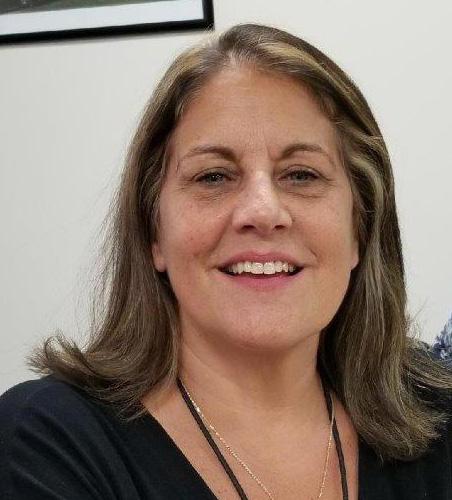
Tami Rucker, Region 1 Administrator
Long time PBS supervisor Kathie Lloyd from the Kennewick HCS office is retiring at the end of May, and we will miss her tremendously! As part of her send-off, some of the Region 1 financial management team got together recently “in tribute” at the Splatter Zone in Richland. It was a colorful opportunity to do some team building and get out some frustrations; plus, what better way to tell Kathie we care & will miss her, than to turn her into a human rainbow?


Erin Klones, Acting
In Region 2 HCS, our 2024 Word of the Year is Connection. In early June, we got the opportunity to create connections and show appreciation to staff across the region at two Employee Appreciation picnics. On June 11th, we gathered at Hillcrest Park in Mt. Vernon and on June 13th, we gathered at Seward Park in Seattle. Region 2 has been through a lot of change over the past year and both events were a great chance to recognize the hard work and dedication of all of our staff.
Both events featured a competitive cornhole tournament…with the teams at the Mt. Vernon event proving their dedication by playing through a rainy downpour (some while wearing garbage bag ponchos!). The weather was more cooperative for the event in Seattle and we even had a water balloon toss…with the most indestructible water balloons in the world!
Staff were treated to delicious food, ice cream and tons of candy…which was fitting for the Candy Land theme! Many thanks to the supervisors and managers who organized, set-up and cleaned up these events!
It sometimes feels like we don’t have the time or resources to adequately recognize the hard work of HCS staff. These annual events are an opportunity for recognition, fun and connection. As a region, we are also working hard to show recognition and appreciation all year long. Staff can recognize their colleagues in our monthly newsletter and our Kudos page. Supervisors come up with a variety of creative ways to celebrate their units and their accomplishments. And Managers are planning program wide All Staff meetings for 2024.
I encourage staff throughout HCS to take some time to acknowledge the efforts of your colleagues. Whether it’s a simple thank you, a shout-out in a meeting or a note of appreciation, these small gestures can make a significant impact. Celebrating each other’s successes and providing support during challenges helps us all thrive, connect and grow together.
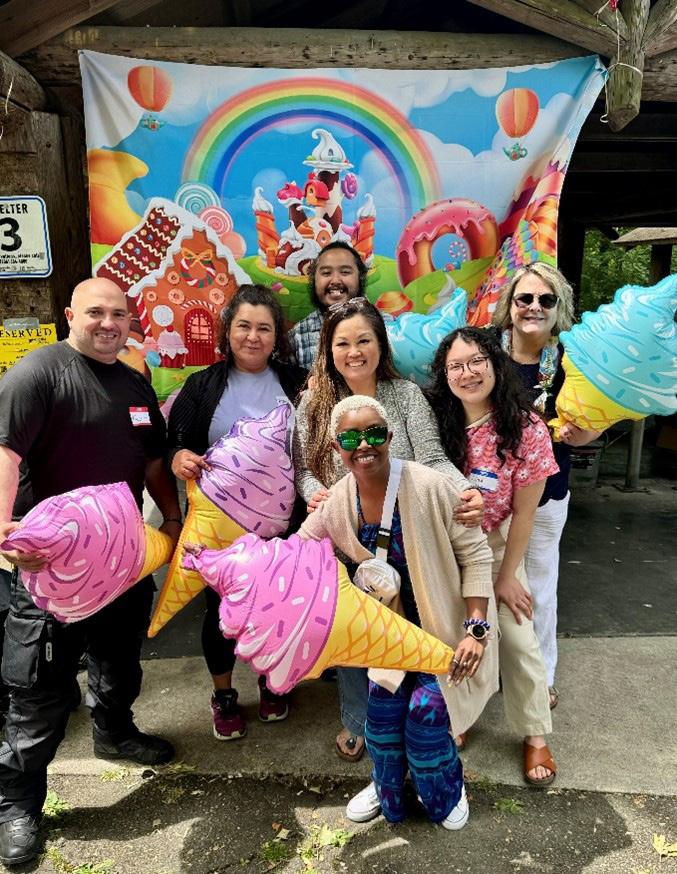



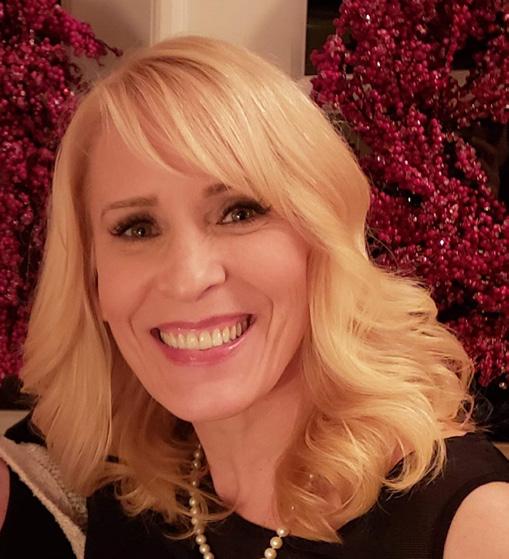
The DSHS and other state agencies have partnered with University of Washington’s Evans School to offer state employees the opportunity to participate in a new graduate certificate in Leading Public Innovation. This program provides practical knowledge, frameworks, and tools to public service leaders committed to improving equity, inclusiveness, effectiveness, and efficiency of systems that deliver public programs and services.
Within HCS, our very own Christine Romo, Hospital Program Manager applied and was accepted into the certification program. (Congratulations, Christine!)
Christine is working with a project team, which includes Nicole Dronen, Brenda Grayson, Dexter Santiago, to look at our current hospital transition planning processes. They are reviewing prototype changes to better infuse cultural needs and preferences into transition planning, specifically within the acute hospital case management teams. They are looking at how HCS can better use this information to improve outcome for clients being served by including culturally tailored services and supports into case planning.
The project team is working under the premise that conducting a culturally tailored assessment enhances individuals’ motivation, and engagement, builds rapport, and allows providers to be culturally responsible when providing personal care. Some examples of culturally tailored support and services that may be built into care plans include, but are not limited to, supporting:
• Veterans to get healthcare from the Veterans Affairs, or help veterans attend veterans’ events or find an adult family home that other veterans reside.
• Non-English-speaking clients in having caregivers that can communicate in their native language. Individuals where English is a second language often struggle with English as their cognition declines and may need from a caregiver that can communicate in “their” language.
• Foor preferences. Food is often associated with one’s culture. Whether clients living in residential settings or living at home where home-delivered meals are served, food preferences are important.
• Supporting cultural differences around end-of-life care. For Native Americans, each tribe has their own rituals around death. Each tribe or nation have different rituals that should be identified early and honored for the individual after death.
• Personal care preferences: does the person like to be touched? This can impact how the individual will react to caregivers when care is being given. Caregivers help with tasks like toileting and bathing. Are there religious beliefs about people of the opposite sex touching or providing help with intimate tasks such dressing and bathing? This can impact how the individual will accept support from others.
This project provides an opportunity to re-examine our current practices and imagine more equitable and inclusive supports and services. It also creates opportunities to hear the voice of the client and collaborate using Human-Centered Design. As the team moves forward, they will continue to gather input from clients and staff, work on a root cause analysis and prototypes, as well as document results and lessons learned. Their final presentation for their certification will be held in September.
We wish them success in this endeavor and are grateful they have taken on such important work to improve outcomes for clients by providing culturally relevant support and services

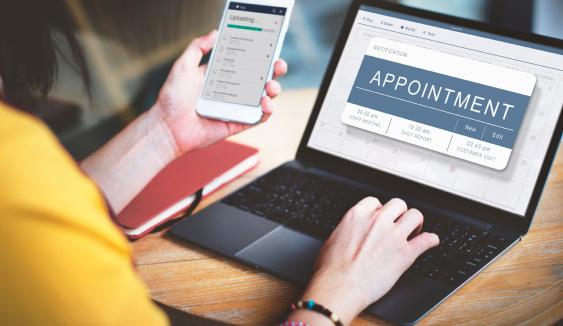
By Amy Besel, ALTSA Senior Organizational Development Administrator, Office of the Assistant Secretary

Thank you for all you do to take good care of yourselves and each other. We are a dedicated, passionate, hard-working bunch of public service champions here in ALTSA! It is also true, we can have a difficult time pumping the breaks, whether that is because of the sheer volume of work or our own drive, it is not in anyone’s best interest to “keep the peddle to the metal” every minute of every day.
As an organization and individuals, we set the tone for our cultural norms. One of those norms must be empowering each other to prioritize our wellbeing as we go about our mission-driven work. The best way I know to do this are to “Name it and Claim it”.
• We have done this in ALTSA by adding a question about your wellbeing to the annual DSHS Employee Survey and ensuring the measure is part of our Strategic Plan (see 17.1.1)
• As individuals, you can empower yourself and others by leveraging your calendar and using your technology systems to help you (see specifics below).
Here are some things to consider:
• Schedule and take your breaks and lunch (these are required by employment law for a reason, by the way. Talk with your supervisor if you have questions about how to ensure this happens for you in your role.)
• Create a planning time in your calendar and hold it sacred (taking time to plan and prioritize your work reduces anxiety and improves outcomes. Sign-up for the Focal Point “Everything One Note” to learn a great tool for planning and prioritizing work.
• Ensure you have transition time by setting your calendar meetings default to end 5 or 10 minutes before the half-hour or hour, use an agenda, and end your meetings at the scheduled time (this way you help yourself and others.) Here is a simple “How To” to help you do this.
• Leverage Microsoft Teams to help you with your daily start and end time boundaries by using this Virtual Commute “How To” sheet created and shared by Kara Barns, Adult Protective Services R1 Critical Incident and Employee Stress Management Consultant.
• Build in Mindfulness Moments, which are 1-3-minute breaks to focus on your breath and clear your mind, by being aware of your senses. Whether at a desk or in your car between appointments, or even at the start of a meeting, pausing is valuable and helps us prevent and overcome burnout. Here are some other tips about mindfulness at work you may find helpful.
Using the above strategies will help you transition from one important task to the next. Supporting your wellbeing and success helps us strengthen ALTSA’s culture and outcomes as we go about the important work of Transforming Lives, together. Thanks for supporting transition time for your wellbeing. It matters, as do you!


June is national Alzheimer’s and Brain Awareness month – and a good time to highlight the newly updated Washington State Plan to Address Alzheimer’s Disease and Other Dementias, 2023-2028 This plan is a call to action for the legislature, aging advocates, and service providers around the state. The Dementia Action Collaborative (DAC) developed and guides implementation of the state plan which sets out visionary goals and recommendations to raise awareness, promote timely and accurate diagnosis and treatment, and improve supports and services for individuals and families who are living with dementia.
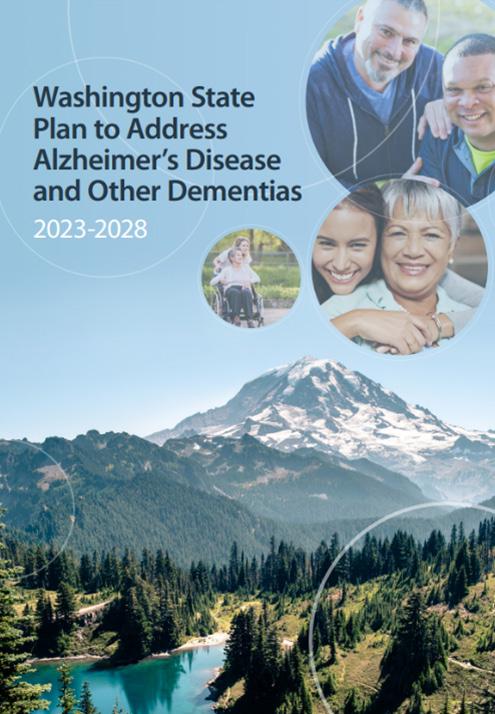
Our increasing population
Alzheimer’s disease is the 4th leading ageadjusted cause of death in Washington state. In 2020, around 125,000 people were living with Alzheimer’s disease or other dementias in Washington. By 2040, that number is expected to be more than 270,000.
The progressive nature of dementia, its long duration, and its effects on memory, self-care and decisionmaking create challenges for individuals and families. While caring for a family member or friend living with dementia can be rewarding, it can also have its challenges and some caregivers experience stress, isolation, depression, health risks and financial strain. Currently, there are more than 213,000 unpaid family care partners of people living with dementia in Washington.
Tailored to both public and professional audiences, the state dementia plan offers a look at the current landscape of dementia, shares recent advances in knowledge about brain health and dementia risk factors, population trends, enhancements to aging and long-term care supports, and highlights dementia-related public health initiatives, state funding, and community resources.
“While there is no cure yet for dementias,” says Bea Rector, co-chair of the DAC, “there are actions we can take to build upon advances in knowledge and better prepare our state for the decades ahead.” The DAC released the first state plan in 2016 and advanced many of its recommendations.
Major accomplishments include the development of resources for individuals, families and professionals, such as the Dementia Road Map: A Guide for Family and Care Partners (View online English | Spanish | Russian). This key resource increases awareness about “what to expect” over the course of dementia, what resources may be helpful at different stages, and how to access services and resources. Written in a clear and positive voice, the guide helps readers understand what they can do to help and includes concrete Action Steps to take along the dementia journey. While it can be accessed online, more than 100,000 paper copies of the booklet have been distributed in Washington state – and it has been replicated in many other states. “The Dementia Road Map is intended to inform family care partners,” says Lynne Korte, Dementia Care Program-Policy Manager, “but has also proven helpful as a tool for case managers and health care providers in their professional work as they can use it to guide and discuss dementia with individuals and care partners.”
The DAC advocacy subcommittee also began a series of requests from 2017-2022 to gain support from the state legislature to fund priorities in the state plan. This included:
• DAC staff in four state agencies. Designated staff at Aging and Long-Term Support Administra¬tion (ALTSA), Department of Health (DOH), Developmental Disabilities Administration (DDA), and Health Care Authority (HCA) each work to bring attention to dementia in their respective agencies and to support the work of the DAC in implementing select¬ed plan recommendations.
• Training for health care providers. New guidance and resources for health providers is a key outcome. DAC successfully gained funding for the UW Memory and Brain Wellness Center (UW-MBWC) to launch Project ECHO Dementia, co-led by Kris Rhoads, PhD, associate professor of neurology at the UW School of Medicine. This tele-mentoring model brings together front-line primary health care providers from throughout Washington state to meet in a virtual conference room with an interdis¬ciplinary panel of experts in memory loss and dementia.
• Early legal and advance care planning support. New resources and services to help people plan as they age, is another success, offering opportunities for individuals to consider and document their choices, preferences, and substitute decision-makers ahead of the time they’re needed. A DAC team developed the Dementia Legal Planning Toolkit, and then the Dementia Legal Planning Program. This innovative program provides free assistance to complete powers of attorney for finances and health care, health care directives, and dementia directive forms. Operated by the Washington Pro Bono Council (PBC), this program educates attorneys throughout the state about legal and advance care planning and raises awareness in the public on the need for planning and the availability of the Toolkit. PBC staff also matches interested, eligible clients (individuals 60+ or early dementia of any age) with attorneys who are trained and volunteer to provide this specialized assistance throughout the state.
• Raising public awareness. A key to all the efforts in the plan is raising public awareness, particularly in population groups at disproportionate risk for dementia. The state Department of Health (DOH) has worked the last several years with contracted media organizations to conduct insight interviews and focus groups with Black, African American and Latino communities to determine culturally appropriate outreach strategies and create tailored messages around dementia and the value of timely diagnosis. New materials are available on the DOH Dementia page and are being taken into communities through collaborative DOH/ALTSA project efforts to engage with faithand community-based organizations.
• Dementia friendly communities. A DAC team, collaboratively piloted Dementia Friends, a global public awareness movement that strives to change the way people think, act, and talk about dementia. After demonstrating positive results here in Washington in 2019, the state legislature funded a staff position to be housed at the UW Memory and Brain Wellness Center (UW MBWC) to expand the program across the state.
“Dementia awareness has taken a great leap forward thanks to the state-funded Dementia Friends program manager position. With the program now operating in over 20 counties, Dementia Friends will continue to be a key piece of the DAC’s work for the next five years,” said Marigrace Becker, Program Manager, Community Education & Impact, UW MBWC. Anyone can participate in Dementia Friends Washington
Building upon the Project ECHO Dementia virtual platform and the momentum of Dementia Friends, a DAC team also launched the Dementia Friendly Washington Learning Collaborative which acts to inspire, equip and support expansion of demen¬tiafriendly community efforts by sharing with and learning from other individuals and organiza¬tions across the state.
• Building Dementia Capable Communities. In a another effort, the DAC, ALTSA and three Area Agencies on Aging (AAAs) are demonstrating the new Building Dementia Capable Communities program (BDCC), that includes Dementia Resource Catalyst staff and funds for dementia-specific services holds promise to engage and assist people living with memory loss or dementia to stay active, socially engaged, and in their own homes; to support family caregivers so they can stay healthy and continue to help their loved ones with dementia; to increase the dementia-capability of the Aging Network; and to promote partnerships and efforts that build Dementia Friendly Communities. The AAAs participating are Aging and Long-Term Care of Eastern Washington, Northwest Regional Council and Olympic Area Agency on Aging.
“The DAC originally came together from their varied perspectives – long-term care, health care, public health, community-based organizations. The group has pushed through challenges together. Even throughout the pandemic, we tracked more than 1,800 hours of voluntary service each year to help address recommendations in the plan,” says Korte.
Over the last year or so, the DAC engaged in a comprehensive process to update the original state plan. The DAC heard from the public about their greatest concerns and ideas for improvements and incorporated new knowledge and lessons learned about implementation. This resulted in the newly updated Washington State Plan to Address Alzheimer’s Disease and Other Dementias, 20232028
This updated plan recognizes the stronger evidence base we now have for reducing potentially modifiable risk factors for dementia, new knowledge around brain health, and emphasizes health equity for all Washingtonians.
The DOH recently received the federal BOLD Grant to improve public health infrastructure related to Alzheimer’s disease and other dementias. This grant, along with our state funding, will foster more focused work to address the potentially modifiable risk factors for
dementia and timely diagnosis in populations with an elevated risk of dementia, such as Black/African American and American Indian/Alaska Native communities.
“The recent update of the state dementia plan is a great opportunity to further the work already underway, including education around detection, diagnosis and treatment of dementia for primary and specialty care providers,” says Kris Rhoads, PhD, a neuropsychologist at UW’s Memory and Brain Wellness Center. “Project ECHO Dementia has already reached over 190 providers in 70 unique practice locations and the updated plan will extend our impact with this and other aligned work, including Dr. Barak Gaster’s Cognition in Primary Care program.”
Included in the plan, as Appendix C, are concrete, do-able actions we can all take to help address the goals of the plan. For example, those involved in the aging network and longterm care could do the following:
• Share information about the warning signs of dementia, and the value of a timely diagnosis - Dementia DOH.
• Reduce stigma around dementia by becoming a Dementia Friend
• Help families plan ahead - make the Dementia Road Map: A Guide for Family and Care Partners available through your organization (available in English, Spanish, Russian) – share a link to it or request paper copies on the DAC webpage for individuals and families.
• Share with family caregivers the availability of free online training and support opportunities through a WA-tailored website - WA Caregivers Learning Portal
• Let people know about the Dementia Legal Planning Toolkit, and the Dementia Legal Planning Program.
• See the dementia plan Appendix C: Suggested Actions for Partners for more ways to help.
Article submitted by Lynne Korte, Dementia Care ProgramPolicy Manager; written in collaboration with Marigrace Becker, Program Manager, Community Education & Impact, UW MBWC


R1 has worked with a 25-year-old female client who has been homeless since she was 14 years old. She spent a significant amount of her life in juvenile detention and jail. She has also been detained nine times due to being gravely disabled. Sadly, she has been sex trafficked, beaten, held against her will, hit by a car, and most recently had three digits on her right hand and two digits on her left hand amputated due to frostbite over the winter. This client has had every reason to give up, yet she has persevered with dreams of something more. In February 2024, she was homeless and using drugs and prostitution to stay alive. The temperatures fell below freezing for several days and nights, and she was exposed to the elements for an extended amount of time, which resulted in the amputations. Following this surgery, she was detained at a local psych hospital for stabilization on psych medication. HCS received a referral for a functional assessment to find her a stable place to live. Our RSW Program Manager, Tonia Juarez, knew this client from her previous employment and volunteered to complete the assessment. Following the functional evaluation, Tonia found a home for the client at an Adult Family Home in Clarkston. This is the first time this client has had stable, structured housing and had a few rough weeks acclimating. Following the first few weeks, however, our client has stated she loves her home and recently asked permission to be happy in her new home as she does not want to leave.

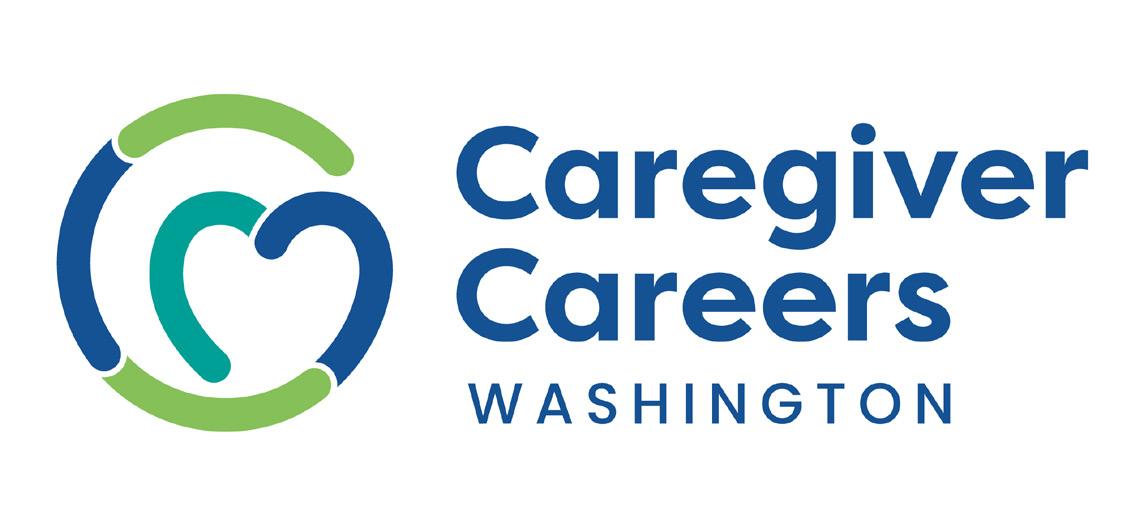
The Spring’s Workforce Spotlight newsletter is now available. This quarterly publication has a full slate of stories related to the recruitment and retention of caregivers. Check it out at https:// caregivercareerswa.com/workforce-spotlight

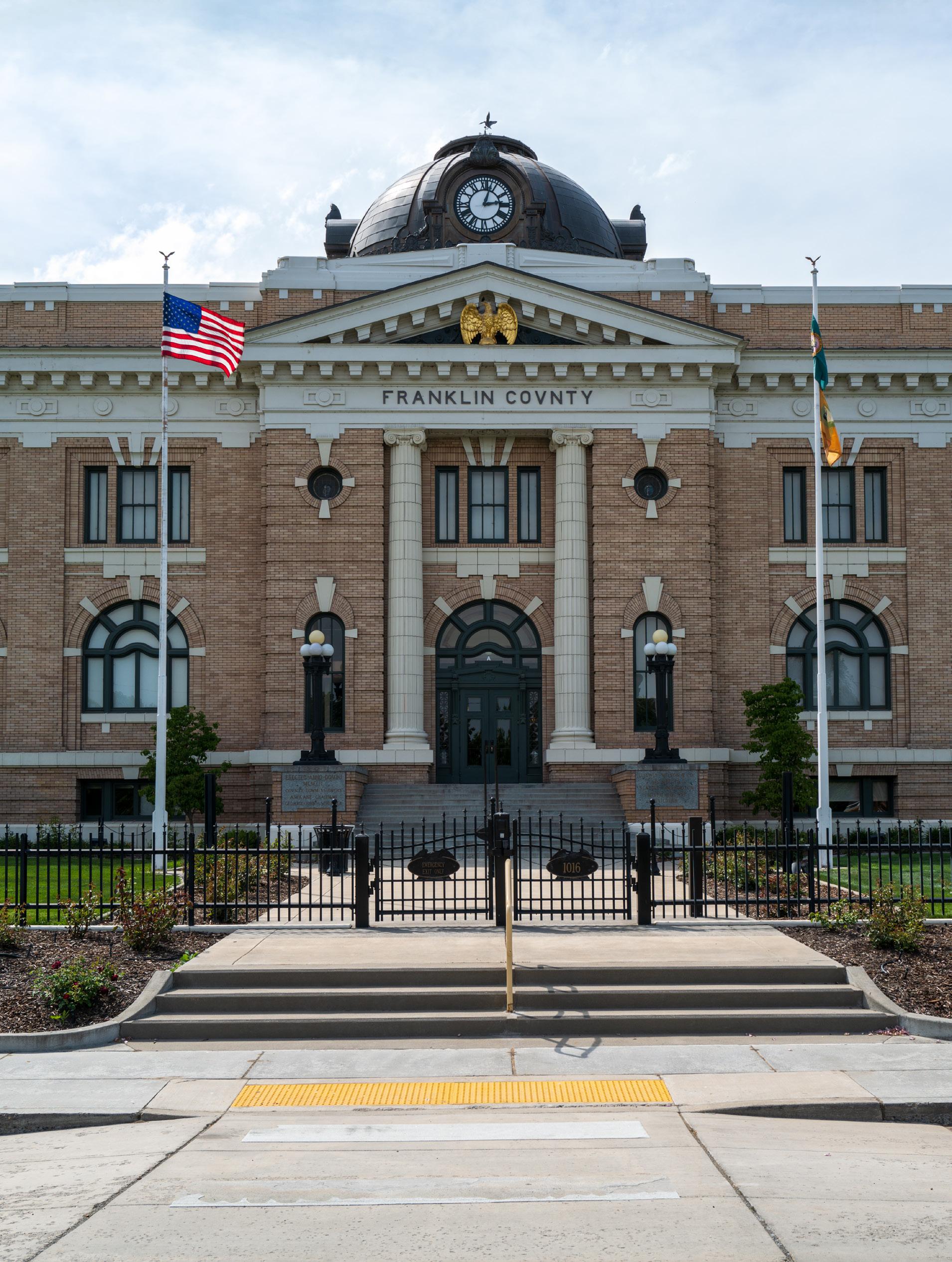
Do you have a story tip? Want to submit a photo of Washington’s scenery?
SEND THEM TO ALTSACOMMS@DSHS.WA.GOV. Franklin County Courthouse in Pasco